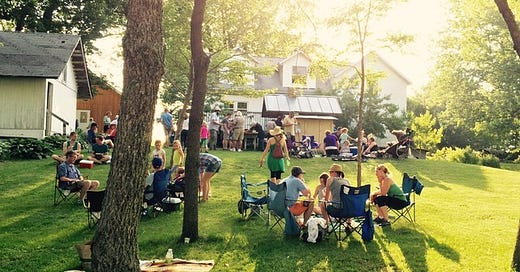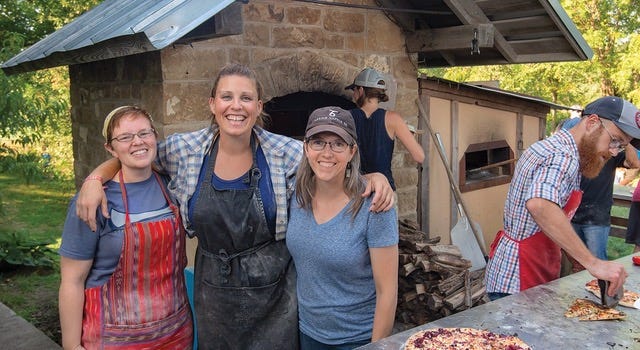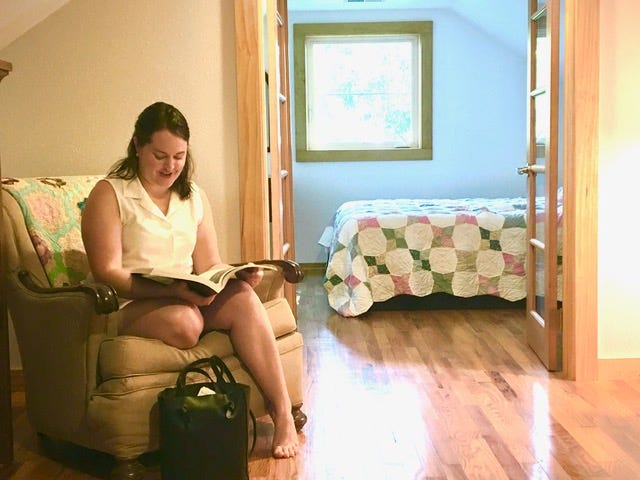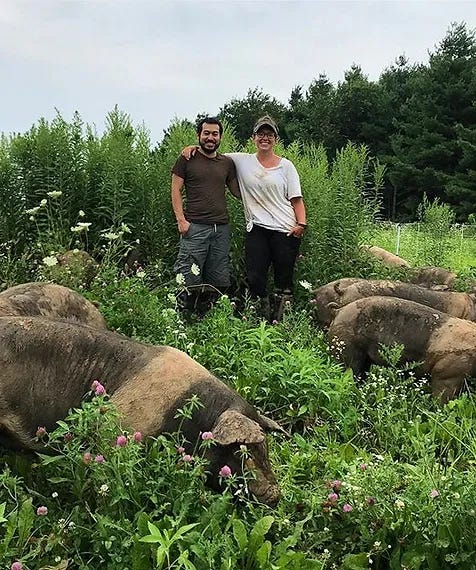I didn’t realize I had walked into the fantasy I’d always had of a quiet(er) life. And it didn’t involve unplugging in the distant mountains or the desert. It was just an hour and a half drive away by car.
During my first season, I asked the question: “Why does everyone think I grew up on a farm?” but it really could have been “What is a farm?”
I’m sure we all have a vision of what a farm is, and in many cases, it comes from popular culture, romanticizing or poking fun at farm life.
My earliest memories of farms are from children’s books, like Spot Goes to the Farm (Eric Hill). I remember my parents making the sounds of the farm animals, much to my delight. I also remember two of my favorite TV shows growing up, Mr. Ed and Green Acres, both shows poking fun at farm life, reflecting the trend at the time they were created to move away from farms to urban areas.
The connection to farm animals is perhaps universal — and it doesn’t matter where you live, farm or non-farm — so why is it sometimes looked down upon to be among them?
Stereotypes
Growing up in an urban area, I distinctly remember hearing the derogatory term, “hicks,” thrown around to describe anyone living outside of the urban circle where I lived. I didn’t think much of the term, or how I was internalizing it, until I met a good friend who broke that stereotype. There’s nothing like a close friendship to break stereotypes.
As I grew older and moved out to the Bay Area, specifically, I often sought out small communities, finding my place of choice — the mountains — for escape. There was a period of approximately four years, where I dedicated all of my spare weekend time to camping and climbing in Yosemite. During the week, I climbed at a local gym, pushing my physical limits and pursuing Yosemite Valley campsites like they were literal treasure.
At the end of the day, I realized my ambition to go to Yosemite was as much about adventure as it was about the ability to escape the urban life that I didn’t really love anyway.
“Any fool can love the mountains, but it takes a subtle mind to love the prairie,” Dr. Brian Rumsey, on a quote his professor said (In Pizza Farms and Community in Iowa)
Agritourism and Entrepreneurship
In The Mundane and the Beautiful, we heard from Anna Geyer, who talked about how she came to understand herself as an entrepreneur, and built a successful pizza farm out of an inclination. She continues to follow her intuition with the Land Alliance Folk School and Retreat Center and teaching classes to new entrepreneurs.
After that episode released, I heard from many of you, who happen to be entrepreneurs or are considering it seriously, that she inspired you and reminded you of your reason to create an entrepreneurial life.
Says Anna,
“I really think we need to claim time as freedom because freedom gives us this opportunity to choose what we're doing in that container of time.”
Even though she is the first to admit she’s settling more into the farm work rather than pushing too hard on her other projects, she is also continuing to hold space for others on her farm.
She has an AirBNB, which is how I found her.
“I think in the broader agritourism conversation, it's often this experience of connecting people to farms, it's connecting people to land who otherwise wouldn't experience the land, who wouldn't experience farm, who wouldn't eat the food directly out of the ground. That is at the heart of what agritourism provides — this connection, education and community. And of course, it helps the farmers in that it supplements income.” - Anna Geyer
And I keep returning to her farm for self-led retreats. I have made it a personal goal to return to her farm or somewhere similar, at least once a quarter, as travel and retreating is the quickest way for me to feel like myself again after a few weeks of caregiving/working full-time.
And, how about those farm animals?
I first met a pig that was getting prepared to be food when I worked for The Mountain Institute, which at the time worked with mountain communities around the world to help them develop comprehensive, community-based projects designed to help locals diversify their livelihoods. As the Executive Assistant of that small nonprofit organization, it was partly my role to periodically travel out to Spruce Knob, Virginia, from Washington, D.C. to help with board meetings.
Spruce Knob was stunningly beautiful, home to an outdoor education center during the summer season. The people at that location lived very minimally, with compost bins and solar panels, the works for perfect off-grid living. The pigs there would thrive on food all year and ceremoniously be offered for food that would serve the community for months after.
It was a different orientation to food, as it comes from animals, that I appreciated (even as I was a vegetarian when I worked there). There is a reverence that comes for our animals that is perhaps connected more closely when you are deeply acquainted with them.
Says Anna:
“One thing that I think non-farmers really have a hard time understanding is how a farmer can truly love their animals, which we do. These animals matter to us. We care for them, and they become our food.”
Dayna Burtness
I met Dayna at Anna’s entrepreneurship retreat. Dayna Burtness is the co-owner of Nettle Valley Farm. Nettle Valley Farm is a 70 acre farm in Spring Grove, MN, just north of Decorah, IA. Their mission is to raise the best pastured pork possible, increase the resilience and biodiversity of the land we steward, be good neighbors, and pay it forward whenever they can. She is intimately connected to her pigs, even though their fate has a near conclusion.
In Anna’s episode, we talked about the culture surrounding entrepreneurship, and how glamorous it was to hustle, hustle, hustle. Dayna and I had a separate conversation about this, as well as her own orientation to being a farmer and how she shifted her perspective over time.
Holistic Management
Holistic management is a practice that “empower[s] farmers & ranchers with the knowledge of regenerative agricultural practices that help them heal the land, strengthen their businesses and improve quality of life,” (HMI’s website). I first learned about this concept from Dayna (see this featured article in PFI’s magazine for more on this).
Holistic management, Dayna explains, helped her to realize that she was burned out and, in her words, “subsisting on string cheese and Diet Coke” to keep up with the demands of vegetable farming.
She took a class offered through the Land Stewardship Project and took to heart a lot of the principles of holistic management, which are also in line with life design. “What does it take to be happy and healthy?” She wondered.
She says,
“I think pastured livestock farming is much, much, much easier on the body, mind, and spirit.”
The primary difference to the farmer is in how the end product grows — pigs grow because she’s feeding them, but they’re the ones growing by eating, whereas with vegetables, they only grow if she puts in a lot of physical effort.
Thank you!
Thanks all of you for your support in the launch and beyond! One of the highlights for me was making it to the ia Magazine’s newsletter, a personal favorite. With a tagline like “ia is our love letter to Iowa, covering arts and culture, home and garden, food and dining and destinations,” how could I not read this publication?
Coming soon
We are in planning mode for the next season and would love to hear from you about your ideas on the Iowa cycling culture, trail cities, and/or nutrition (yes, it’s going to be a comprehensive one, and it’s all connected:)). Email me directly at warmlyiowa@gmail.com with any ideas of individuals to connect with.







